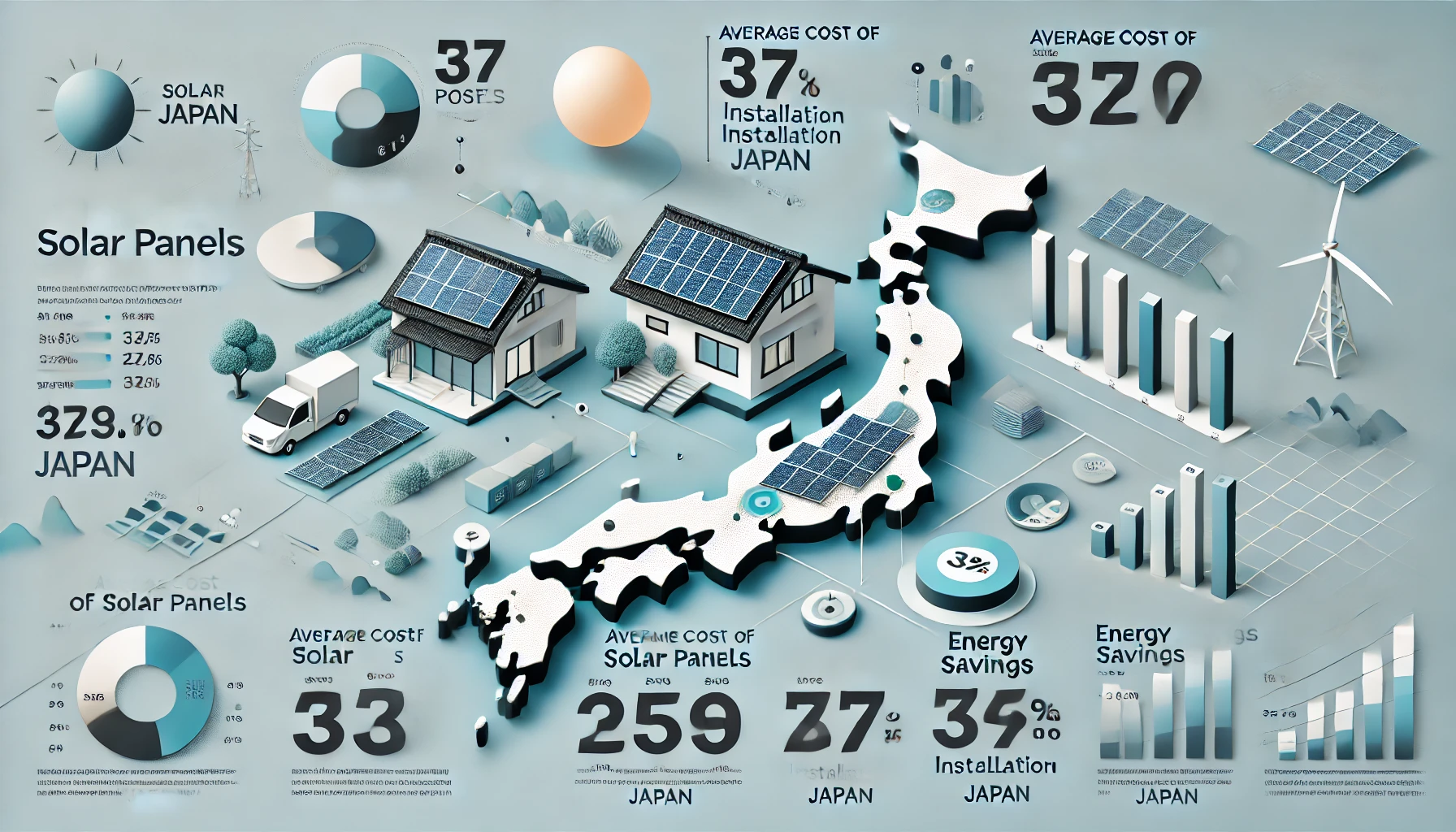Japan has seen significant solar market expansion over the years. Starting with their feed-in tariff (FIT) scheme launched in 2012 – providing incentives for solar panel installations through long-term payments for electricity production from solar panels installed – Japan quickly became one of the leading producers of renewable energy worldwide, now boasting over 80 gigawatts of installed capacity!
Japan has taken various steps to facilitate its transition towards renewable energy sources, including Feed-In Tariffs and various policies designed to promote it. As part of these efforts and developments in solar technology, solar panels have become more affordable and accessible to individuals as well as businesses alike.
Solar Panels Cost in Japan
Solar panels typically range in cost between ¥150,000 and ¥250,000 per kilowatt (kW), so for an average home with a 4kW system, the total installation costs fall somewhere between ¥600,000 to ¥1,000,000.
- Solar Panel Costs:
Solar panel costs often comprise 40-50% of total installation expenses in Japan. Their price per watt varies based on efficiency and technology; higher quality panels like monocrystalline ones often cost more but provide greater performance and longevity. - Inverter Costs:
An inverter converts direct current (DC) electricity generated from solar panels to alternating current (AC) electricity suitable for household appliances, with prices typically ranging between ¥50,000 to ¥100,000, depending on brand and capacity considerations. - Labor Costs for Solar Panel Installation in Japan:
Roof type, complexity of the installation process, and location all influence installation costs in Japan. Labor costs associated with full solar panel installations typically fall within the range of ¥100,000–300,000 per panel installation project. - Additional Costs:
Additional costs could include permits, wiring, and infrastructure needs that go beyond basic home building requirements; fees usually fall between ¥50,000 to ¥100,000.
Breakdown of Home Size Costs
- Small Home (3kW System):
For a home with a 3kW system, total costs would range between ¥450,000 to ¥750,000. - Average Home (5kW System):
With regard to medium-sized houses equipped with 5kW systems, total costs typically fall within the range of ¥750,000–1,250,000. - Large Home (10kW System):
For larger homes, costs could range anywhere from ¥1,500,000 to ¥2,500,000.
This estimate does not account for maintenance or repair expenses that may arise over time.
Factors Affecting Solar Panel Prices in Japan
Solar energy prices in Japan depend on various factors, so understanding them will enable you to estimate their overall costs at your home.
- Technology and Efficiency of Solar Panels:
Solar panels’ efficiency plays a crucial role in their cost. Panels that convert more sunlight to electricity result in better energy output while taking up less space – but high-efficiency panels often come at a premium price; monocrystalline solar cells tend to be the most energy-efficient and long-lived, thus costing more than polycrystalline counterparts. - Brand and Manufacturer:
Solar panel prices also depend heavily on their brand and manufacturer. Popular names like Panasonic, Sharp, and Kyocera typically provide higher-quality panels at higher costs; lesser-known manufacturers may offer more cost-effective prices but may have reduced efficiency or shorter warranties. - Roof Type and Size:
Your cost of installation can depend heavily on the type of roof you have. Roofs with steeper angles or intricate designs may require additional labor and materials, and depending on its size, it will determine how many solar panels can be installed, which impacts overall costs.
Government Incentives and Subsidies
Government incentives and subsidies are key in lowering the initial cost of installing solar panels, especially in Japan where homeowners and businesses alike benefit from various subsidies and tax credits for installing systems like feed-in tariff (FIT) systems that guarantee payments for electricity generated by these panels for up to 20 years, guaranteeing an eventual return on investment for both households and businesses alike.
- Location:
A property’s geographic location can also have an effect on installation costs. Densely populated urban areas like Tokyo may see greater demand for solar panels, driving up costs. Conversely, rural areas often boast lower competition and more available space for these systems to be installed more affordably.
Solar Panel Incentives in Japan
To encourage widespread adoption of renewable energy sources such as solar power, Japan provides numerous incentives that reduce installation costs for solar panels while simultaneously increasing renewable usage.
- Feed-in Tariff (FIT) Scheme:
Japan’s Feed-in Tariff (FIT) Scheme was implemented in 2012 to support renewable energy development. The Feed-in Tariff (FIT) guarantees homeowners and businesses who generate solar panel electricity a fixed payment; depending on system size and installation date, rates range between 14–22 yen per kWh for payments made directly by solar panel owners under this long-term contract, which lasts 10–20 years, providing reliable income. - Tax Incentives:
Japan also provides tax benefits to both individuals and businesses that implement solar energy systems, including tax deductions or exemptions on residential solar installations reducing overall costs. - Subsidies and Rebates:
Local governments in Japan also offer subsidies and rebates to encourage solar energy adoption, typically covering part of the installation cost and offering various levels of incentives dependent on region and system size.
Financial Benefits of Installing Solar Panels in Japan
Solar panels can offer significant long-term financial advantages, making them an attractive investment choice for both homeowners and businesses.
- Decreased Electric Bills:
Solar panels offer immediate savings by cutting electricity bills significantly. Solar panels generate free power that you can generate yourself – helping reduce or even eliminate your dependence on the grid, and therefore, significantly cutting monthly electricity expenses. - Return on Investment (ROI):
In Japan, solar panel ROI typically ranges between 7–10 years due to their relatively high feed-in tariff rates and electricity bill savings; many homeowners can realize a positive return within this timeframe, after which point electricity generated through solar panels becomes virtually free! - Energy Independence:
Generating electricity on your own can give you greater energy independence and protect you from rising electricity prices and power shortages. Furthermore, solar panels enable users to store power for later use when cloudy days or nightfall arrive – further increasing energy independence. - Increase in Property Value:
Installing solar panels can add considerable value to your property. Homes featuring solar panels tend to attract buyers in an age of rising energy costs; particularly in Japan where this trend has become increasingly prevalent among those looking for sustainable living options.
Conclusion
The cost of solar panels in Japan varies based on multiple factors, including panel type, system size, and complexity of installation. On average, however, installation typically ranges between ¥150,000 to ¥250,000 per kW installed – although an initial investment can be significant due to government incentives as well as long-term cost savings on electricity bills as well as potential returns on investment, which make solar energy an appealing solution.
Japan’s push towards renewable energy solutions means solar panel costs will likely continue to decrease, making solar energy even more accessible and affordable in coming years. If your goal is to reduce carbon emissions, save on electricity bills, or boost property values through investing in sustainable solutions like solar energy panels – these panels represent smart investments towards creating a brighter tomorrow.
By selecting an optimal solar panel system and taking advantage of available incentives, you can ensure your investment will bear fruit.

